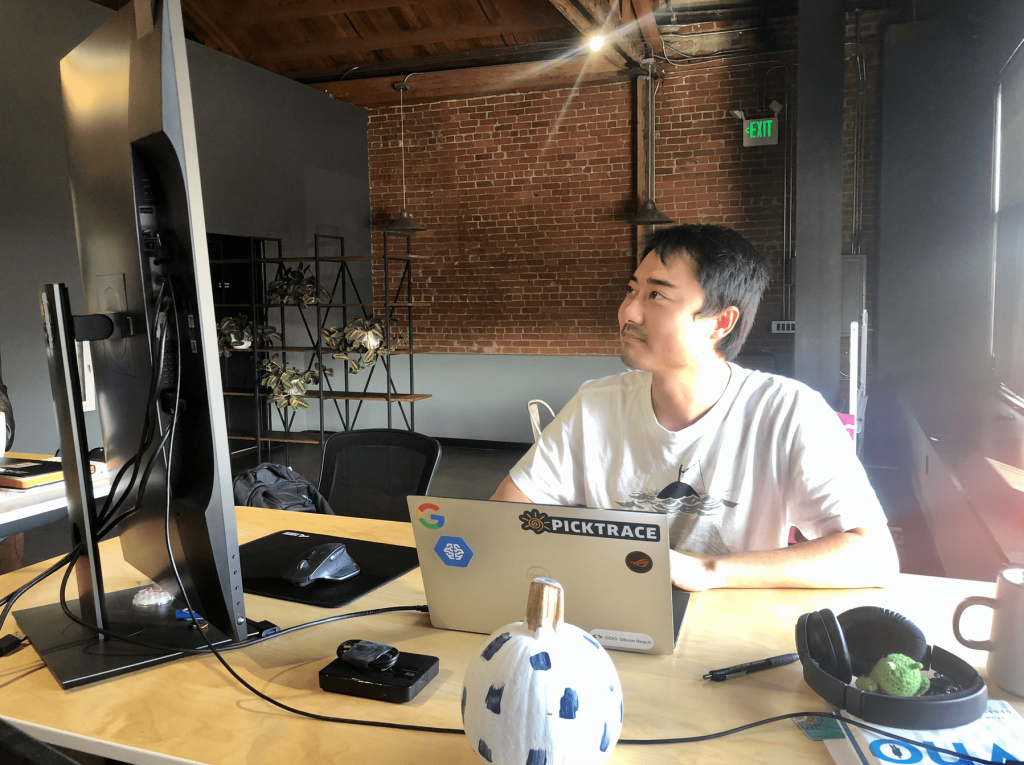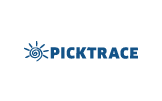
This month, we wanted to give our audience a peek behind the curtain at what it’s like to be an engineer at PickTrace. We decided to do a sit down interview with Renxia Wang, our Senior Software Engineer, who’s been hard at work on our backend services since joining us in August. Read on to find out why Renxia decided to leave Amazon for his first start-up, what the biggest surprises and differences have been so far, and where he sees our culture going from here.
Hi Renxia! Thanks for taking the time to sit down with me. To start, have you ever worked at a start-up before?
No, this is my first startup or even small company. There’s a big difference between working at PickTrace compared to the giant that is Amazon.
What are the biggest differences?
The biggest difference would be the number of people in the company [laughs]. At a small start-up, we don’t have as many managers or processes that a big corporation needs in place. We are moving fast and are dynamic, and we are adjusting our processes along the way while finding what works and what doesn’t. In a big company, it’s all already defined, the culture is there.
Do you feel like you’re helping create the culture here?
Yes, that’s one reason to join a start-up; you will be part of a team that will drive the concepts, drive the process, drive everything that you think wasn’t working in your previous job. There are things at big companies that you can’t do anything about; at a start-up, you now have a place where you can do it.
Was there anything specific along those lines that you wanted to do but couldn’t do at Amazon?
As an engineering team, if you want to move fast, you have to make fast decisions, not spend time trying to figure out something very detailed, or spending time on a lengthy process to get something approved. Here, we identify a problem, discuss the problem, and if we agree on a solution, we go and do it. At Amazon, problems come when people are too focused on writing the darn document, even if it’s a good approach. Writing clear documentation is important, but spending a lot of time on writing a document but not making actual progress in iterating the real thing is not good. At Amazon, it’s very writing heavy, which kind of slows the process down. I have seen people spend eight months writing and updating press release notes saying “in 20-something, Amazon is releasing such and such” — they will spend eight months writing this. They spend a lot of energy trying to focus on whether this is the right thing to do, even if the outcome after eight months might be that it’s not good, and let’s not do it. Here, we have a focused business. We don’t need to spend eight months to discuss what we want to do. The process at Amazon is lengthier than what we have here. At PickTrace, after making a decision, it only takes us a few days. The drawback is we’re moving very fast and we might not get every single edge case, but at Amazon it can take weeks, depending on other teams that aren’t responsive, and everything gets screwed. Here, we all have the same goal and are working toward the same thing.
At PickTrace, you’re working with five or six engineers — how many were you working with at Amazon?
Six to eight at Amazon, but the key difference isn’t the size of the team of engineers you’re working with, it’s actually the number of internal teams that you need to work with. There’s a lot of cross teams at Amazon; at Amazon, SDE stands for Someone Does Everything, not Software Development Engineer — that’s a joke people make at Amazon. For every single system, there’s a different team so you don’t reinvent the wheel. There’s a lot of effort spent by managers, product managers, and SDEs to make sure these teams can work together to deliver. Sometimes, the director needs buy in from another director to say hey, your team needs to work with us. At PickTrace, we don’t have to do that. We are such a small team, but even when we get bigger, we’re still going to share the same goals.
As our team grows, do you think those political or administrative elements are avoidable?
You can’t really avoid having two different teams for two different things. At some point when the company is larger, you have to enable teams to be autonomous. At the same time, the company culture needs to encourage cooperation to have the same shared values, so we can all come to the same decisions on situations. It’s more about company values, driving you to make the right decisions. But at the same time we’re all people, and while we may know the right thing to do, we also know that if I do something else I might get promoted faster — that kind of thing happens. We don’t have a problem with that here right now, and definitely we will build a culture that reduces as many of these cross team conflicts as possible.
As an engineer, are you working on more technology here?
Yes. At Amazon they have their own complete infrastructure, so engineers can focus on business perspectives. Here we don’t have that. At PickTrace, we’re building and deciding what to do while building the business focused logic. As an engineer, I need to deal with both things, which expands my knowledge horizontally and expands my technical skill set. The last time I implemented a TCP server was eight years ago when I was in college! Now I get to do it from the ground up — it’s exciting!
What other things are exciting about working here?
I’m closer to the coworkers here, definitely. It’s a smaller team, and it’s relatively new. We don’t have that many legacy things. We eat lunch together every day. Everyone in the company! That’s possible in some teams at Amazon, but not all the time. I worked for three teams, but only the last team had that culture, and then they doubled in size and people don’t eat together anymore. We want to grow bigger, but the question will be how are we going to keep our early stage start-up culture dynamic when we grow bigger. I think that’s something we’re thinking a lot about.
Thanks, Renxia!
Thank you!


